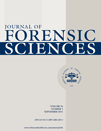Sexual Assault Centres and Police Reporting—An Important Arena for Medical/Legal Interaction*
Funding received from The Norwegian Foundation for Health and Rehabilitation, and Norwegian Women’s Public Health Association.
Abstract
Abstract: This study explores the usefulness of forensic medical examination (FME) irrespective of police request and police-reporting practices at a self-referral Sexual Assault Centre (SAC). The study is retrospective, descriptive: a 2-year series of cases from a Scandinavian SAC and corresponding police files. Among 354 SAC cases, 180 were reported to the police, comprising 103 of 197 total rapes registered in this police district. Of 278 complainants presenting in time for FME, 55% reported to the police. FME was performed in 238 cases, 142 of these registered by the police. In 24% of the latter, examination preceded reporting by ≥2 days. Thus, substantial amounts of SAC casework remain unavailable to the police owing to nonreporting. However, performing FME regardless of reporting considerably increases the amount of information available to the police in late-reported cases. Although several factors predict reporting, the predictive power is insufficient for performing FME selectively.




